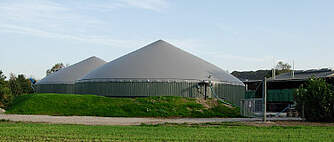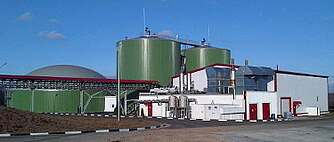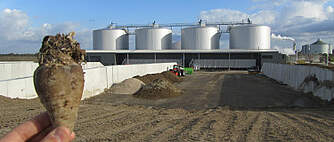Biowaste and kitchen waste
Biowaste is separately collected organic waste generated by households. Depending on the region or country, biowaste may also contain garden waste such as grass cuttings or green waste and may feature seasonally fluctuating quantities and qualities depending on the climate. Therefore the consistency and the energy content vary. The impurity content and degree of incorrect sorting varies considerably. The processing biogas plant must address this by using specified processing technology and a customised fermenter type.
Reference projects:
- Huntstown (Ireland): 2018/2019; 2 x 2,4 MWel; thermal pressurised brown bin and food waste
- Göttingen (Germany): 2007; 254 kWel; percolate from the composting of biowaste
- Gross Mühlingen (Germany): 2003; 730 kWel; biowaste, organic industrial waste
- Blümel (Germany): 1995; 320 kWel; biowaste
Kitchen waste is separately collected waste from commercial kitchens, restaurants and canteens. The consistency is usually mushy or liquid. Due to its energy content and water content, it is better to use biowaste and kitchen waste in biogas plants, rather than making thermal use of it or composting it. However, its often high and greatly varying impurity content makes it difficult to use in biogas plants. Here, specific fermentation processes and carefully planned pre-treatment are necessary. Usually, hygienisation also needs to be included in the process. Using the digestate can be problematic due to the impurity content. If you are planning on using the digestate, this must be taken into consideration when developing the process.
Reference projects:
- Wuhu (China): 2013/2014; biogas upgrading system, fed into the local gridl; kitchen waste
- Quinhuangda (China): 2013/2014; biogas upgrading system, biomethane used for vehicle fuel; kitchen waste
- Mc Donnell (Ireland): 2009; 250 kWel; liquid cattle manure, chicken manure, kitchen waste, animal by-products
- Noyon (France): 2008; 716 kWel; sewage sludge, fat, process water, waste from the food industry, kitchen waste
- im Brahm (Germany): 2005, 2011; 760 kWel; liquid pig manure, horse manure, kitchen waste


